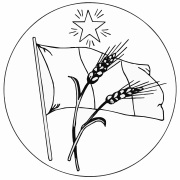National Democratic Union (Italy)
National Democratic Union Unione Democratica Nazionale | |
|---|---|
 | |
| Founded | 1946 |
| Ideology | Liberalism Monarchism |
| Political position | Big tent |
The National Democratic Union (Italian: Unione Democratica Nazionale, UDN) was a political alliance of parties for the 1946 general election, formed by the Italian Liberal Party, the Labour Democratic Party and some other liberal, conservative and monarchist clubs. Its symbol was an Italian flag overcome by a shining star.
History
[edit]The party scored 6.8%, placing itself at the fourth place in the election.[1][2] This grouping, during the sessions of the Constituent Assembly, represented the continuation of the Liberal elite, which governed Italy from the years of Giovanni Giolitti until the rise of Benito Mussolini and the instauration of the Fascist regime.
Important politicians elected on the UDN lists were Vittorio Emanuele Orlando, Francesco Saverio Nitti, Luigi Einaudi, Benedetto Croce, Enrico De Nicola, Gaetano Martino, Giuseppe Paratore, Ivanoe Bonomi, Raffaele De Caro, Meuccio Ruini, Enrico Molè, Bruno Villabruna, Epicarmo Corbino and Aldo Bozzi.
The alliance was succeeded in the 1948 general election by the National Bloc.[3]
Composition
[edit]It was composed of the following political parties:
| Party | Ideology | Leader | Deputies | |
|---|---|---|---|---|
| Italian Liberal Party (PLI) | Conservative liberalism | Manlio Brosio | ||
| Labour Democratic Party (DL) | Social democracy | Ivanoe Bonomi | 8 out of 13[4] | |
Electoral results
[edit]| Election | Leader | Votes | % | Seats | Position | Status |
|---|---|---|---|---|---|---|
| 1946 | Manlio Brosio | 1,560,638 | 6.78 | 41 / 556
|
4th | Opposition |
References
[edit]- ^ John Foot (2014). Modern Italy. Palgrave Macmillan. p. 235. ISBN 978-1-137-04192-0.
- ^ John Lamberton Harper (2002). America and the Reconstruction of Italy, 1945-1948. Cambridge University Press. p. 186. ISBN 978-0-521-52282-3.
- ^ Even if 13 out of the 41 elected deputies were members of the DL, 5 members fled immediately after the poor result of the party.
